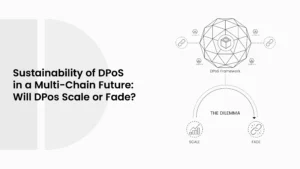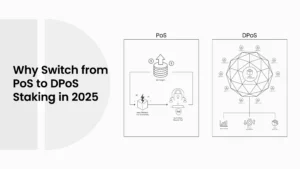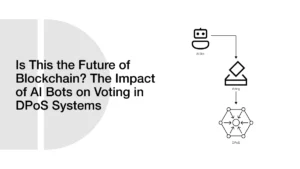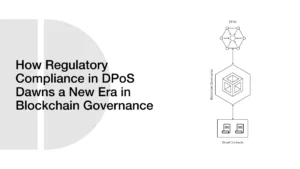How DPoS Turns Token Holders Into Decision Makers | Crypto Democracy in Action
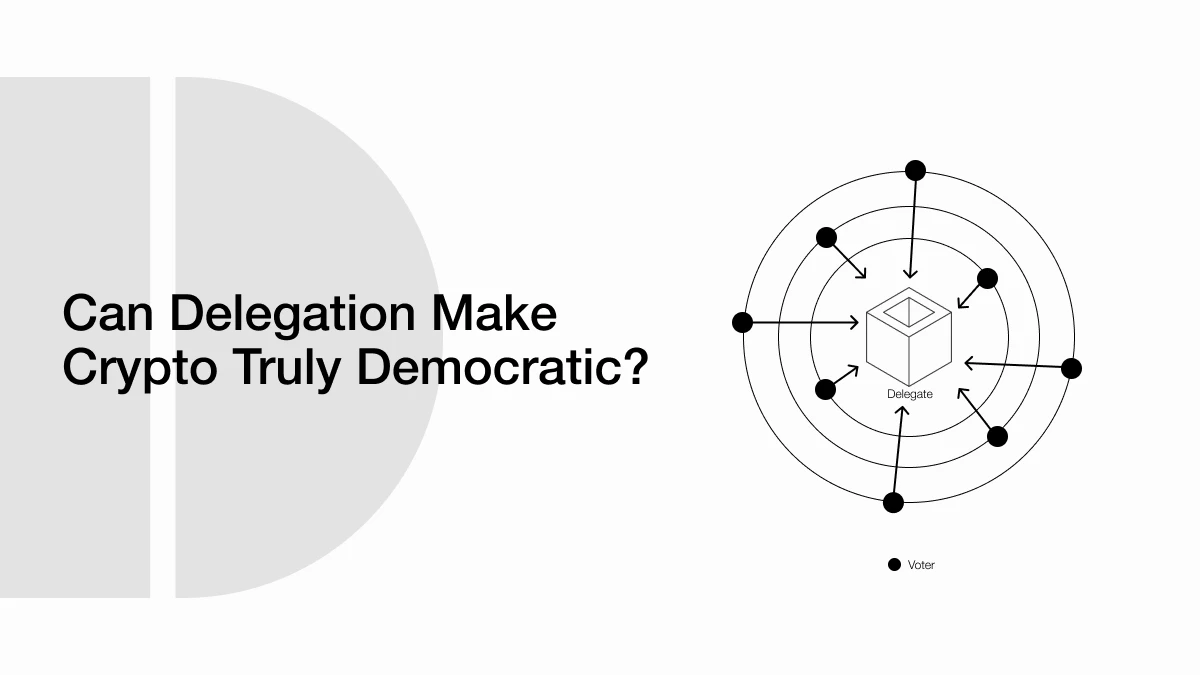
Delegated Proof of Stake (DPoS) empowers token holders to vote for a small group of trusted delegates. These delegates help run the network by checking transactions and creating new blocks. Unlike other systems like Proof of Work (PoW) or Proof of Stake (PoS), DPoS is easier to join. You don’t need expensive machines or a large number of tokens. Even small token holders can take part by giving their vote to someone they trust.
- The Role of Delegation in Empowering Small Stakeholders
- How DPoS Can Be Used in Real Life
- Community Power in Local Utilities
- DPoS in Housing Co-Ops or Local Councils
- Decentralized Charity Voting
- Real Projects That Use DPoS
- Why Delegation Matters for Participation
- What DPoS Teaches Us About Democracy
- Merit-Based Election
- Accountability in Action
- Easy Participation for All
- Lessons for Today’s Civic Systems
- Guarding Against Vote Concentration
- Why Small Stakeholders Can Benefit Financially
- Ensuring Genuine Influence with Game Theory
- Creating a Well-Functioning Delegated Governance Ecosystem
- Final Reflection: Delegation as Democratic Architecture
- FAQs
- Glossary of Terms
Research shows that when implemented with mechanisms like vote decay, slashing, and fair reward sharing, DPoS significantly enhances inclusivity and voter influence across all stake levels (Li et al., 2023; Kiayias et al., 2024). These features allow smaller participants to play a meaningful role in network security and governance. As studies confirm, DPoS transforms delegation into a tool of representation, making it possible for low-capital stakeholders to collectively shape outcomes in decentralized ecosystems (Weidener et al., 2025).
The Role of Delegation in Empowering Small Stakeholders
One of the key problems in many consensus systems is that small token holders lack the technical capacity or economic weight to participate directly in block validation. DPoS uses delegation as a form of representation, enabling these holders to team up behind delegates. Research confirms that delegation allows smaller actors to indirectly shape protocol decisions, gaining influence proportional to their collective voting power rather than their stake.
Moreover, when delegation is paired with well-designed reward mechanisms, smallholders gain financially and politically. As Kiayias et al. (2024) point out, a properly structured reward system motivates delegation but retains safeguards against vote centralization.
How DPoS Can Be Used in Real Life
Delegated Proof of Stake (DPoS) is not just for crypto experts. It can be used in many real-world systems that people already understand. Let’s look at some easy examples that show how DPoS can help in everyday life.
Community Power in Local Utilities
Think about how we get electricity or water in a small town. Imagine if the people in that town could vote on who manages their local power grid. They wouldn’t all have to run the system themselves. Instead, they could vote for someone they trust to do the job. That’s what DPoS does: it lets people vote for someone to act on their behalf.
In this case, the person they choose would make sure solar credits or water usage is fair and recorded using smart contracts. The people still have control, even if they are not managing things directly.
DPoS in Housing Co-Ops or Local Councils
Now, consider that you live in an apartment building. You probably don’t want to fix the pipes or collect rent yourself. But you do want a say in who runs the building. So, you and your neighbors vote for a property manager or board member.
This is just like DPoS. You don’t need to do the work yourself. You just pick someone you trust. If they don’t do a good job, you can vote them out. It’s fair, simple, and democratic.
Decentralized Charity Voting
Think of a big group of people who want to give money to good causes. They all have tokens. But instead of choosing causes on their own, they vote for trusted groups to do it.
These groups use the votes to pick the right charities. The money comes from a shared fund, and everything is open and tracked. This way, even small donors can make a big impact by working together through delegation.
Real Projects That Use DPoS
Many real blockchain projects already use DPoS. These examples show that DPoS works and that it can help large groups of people work together smoothly.
| Project | What It Does with DPoS |
| EOS | Uses 21 elected delegates to run the network. Some of them share rewards with voters. |
| TRON | Has 27 Super Representatives. People vote for them, and many offer rewards and updates. |
| BitShares | One of the first projects to use DPoS. Still active today with regular economic use. |
| Steem/Hive | Social media platforms where users vote for who moderates content and runs the network. |
Why Delegation Matters for Participation
At its core, delegation shifts decision-making from those with high technical or financial barriers to those who hold tokens but might lack the infrastructure to validate blocks themselves. In regular DPoS systems, a user, however small the number of tokens they have, can delegate the vote to someone they trust. This doubling is an effective method of running the voice of the small stakeholders since they can play a role in who becomes a delegate, and how decisions are to be made.
ALSO READ: How DPoS Can Save Crypto’s Environmental Reputation
Using a reputation-based or performance-monitoring overlay, the delegates are also required to remain accountable. “When such systems exist, small token holders can have a better chance of collectively influencing decisions, at least assuming that they can consolidate their voting power to support transparent, high-performing candidates.” The model of CD-DPoS shows that reputation-based games can balance the playing field and give even the smaller token holders a possibility of making an important impact.
What DPoS Teaches Us About Democracy
Delegated Proof of Stake (DPoS) reflects how democracy can work in real life. It brings forward key ideas that are important in any fair and responsible system of governance. These lessons go beyond crypto and can help us think about how we run our communities, cities, and countries.
Merit-Based Election
In DPoS, delegates are chosen based on how well they perform. They must keep the network secure, reliable, and fast. If they don’t do a good job, people stop voting for them. This is similar to electing public officials based on their results, not just promises. It teaches us that people in power should earn their place through proven work, not just popularity.
Accountability in Action
One of the strongest parts of DPoS is accountability. If a delegate breaks trust, is lazy, or doesn’t meet standards, token holders can remove them through voting. This creates a system where leaders must stay honest and focused. It’s a powerful reminder that a strong democracy needs a way to check and change leadership without chaos.
Easy Participation for All
In many systems, like politics or complex blockchains, it’s hard for the average person to get involved. But DPoS lowers the entry bar. Even small token holders, with little technical knowledge, can join by simply choosing someone they trust to vote for them. You don’t need to run your server or be rich. You just need to care enough to vote. That makes it fairer and open.
Lessons for Today’s Civic Systems
There are a lot of problems in the modern understanding of democracy: turnout, mistrust, and central decisions. DPoS proposes a model that is a faster, transparent, and feedback-driven model. It demonstrates how digital instruments can be used to increase appreciation and introduce equity to systems that are alienating or failing.
In short, DPoS is more than a consensus method. It’s a working example of how we can build systems where people truly have power, where voices are counted, and where good leadership is rewarded. It reminds us that strong communities, online or offline, are built when everyone is invited to take part.
Guarding Against Vote Concentration
While delegation enables participation, it is not a guarantee of inclusivity. In both DAO frameworks and DPoS blockchains, studies warn that large token holders can dominate the voting system, casting long shadows over governance.
To counteract that, both academic and industry research suggest several structural solutions:
- Vote caps on how much influence a single account can exert
- Vote decay, requiring periodic renewal of delegated votes
- Reputation or credit-based weighting, rewarding consistent performance (as in CD‑DPoS)
- Quadratic or weighted delegation, which makes it harder for illicit vote accumulation
These mechanisms help ensure that, even if small token holders delegate to a few candidates, no single actor can monopolize decision-making power.
Why Small Stakeholders Can Benefit Financially
Delegation in DPoS often comes with financial incentives. Many delegate nodes share a portion of their rewards with voters, for smaller token holders who cannot validate blocks themselves, receiving passive returns from their delegation becomes a new form of crypto-income. Research into delegation dynamics shows that reward schemes tied to delegation significantly increase motivation to participate.
ALSO READ: DPoS Explained: How Blockchain Users Elect Validators
Furthermore, sharing rewards creates direct accountability. Delegates who fail to distribute rewards or underperform risk losing their voter base. Since smallholders benefit from transparent reward policies, they gain leverage to evaluate and support more effective delegates.
| Consensus Model | Can Small Holders Participate? | Need to Run the Validator Node? | Voting/Delegation Available |
| DPoS | Yes | No | Yes (Delegation-based) |
| PoS | Sometimes | Usually Yes | Rarely |
| PoW | No | Yes (Mining Equipment Needed) | No |
Ensuring Genuine Influence with Game Theory
Studies using game-theoretic models on PoS delegation show that if reward structures are balanced correctly, small token holders are incentivized to delegate to competent validators while also helping keep power decentralized.
Thus, delegation becomes not only a tool of participation but also a strategic means for small-market stakeholders to influence validator selection. With well-calibrated reward curves and commit/revoke mechanics, the blockchain community can ensure that delegation is both inclusive and performance-driven.
Creating a Well-Functioning Delegated Governance Ecosystem
Bringing research and practice together, certain principles become clear for systems that aim to empower small token holders via delegation:
- Open nomination for delegates with clear standards
- Transparent voting and reward reporting to foster trust
- Regular vote adjustments or reelections to ensure accountability
- Mechanisms to prevent vote hoarding and delegate collusion
- Reward sharing policies that benefit voters proportionally
When these structures are implemented, small token holders form and join communities, join forces behind shared priorities, and exert both political and economic influence, even with minimal individual stakes.
Final Reflection: Delegation as Democratic Architecture
The power of Delegated Proof of Stake resides in its capacity to remove participation obstacles. Unlike heavy-weight PoW or centralized PoS systems, DPoS enables token holders, regardless of ownership, to rally behind candidates, influence protocol choices, and share financial rewards. Research in both practical systems and theoretical models reveals that delegation systems that contain safeguards for reputation, reward fairness, and vote distribution allow smaller stakeholders to have a real impact.
By strengthening relationships between token holders and honest delegates, DPoS transforms into a dynamic blend of efficiency, inclusivity, and accountability. It offers a strong yet customizable architecture for blockchain governance, allowing small token holders to actually have influence over the systems they support.
FAQs
- What makes DPoS more inclusive than other consensus models?
DPoS allows small token holders to participate by delegating their voting power to trusted delegates. Unlike Proof of Work (PoW), which requires expensive equipment, or traditional Proof of Stake (PoS), which often demands large token amounts, DPoS lowers entry barriers. Even users with a small stake can help shape governance.
- Can small token holders earn rewards through DPoS?
Yes. Many DPoS systems allow delegates to share a portion of their block rewards with the voters who supported them. This creates a passive income stream for small token holders and motivates active participation in governance.
- How does DPoS prevent a few users from gaining too much power?
DPoS systems often use safeguards like vote caps, vote decay (votes lose weight over time), and reward structures that discourage centralization. These tools help ensure that no single delegate or group dominates decision-making.
Glossary of Terms
DPoS (Delegated Proof of Stake)
A consensus model where token holders vote for a limited number of delegates to validate transactions and produce new blocks on their behalf.
Delegate
A trusted participant elected by token holders to maintain the network, validate blocks, and earn rewards.
Vote Decay
A mechanism that reduces the weight of votes over time unless they are renewed, encouraging ongoing voter engagement.
Slashing
A penalty applied to delegates who behave dishonestly or fail to follow protocol rules, often resulting in loss of stake.
Reward Sharing
A system where delegates share a portion of their earned rewards with the token holders who voted for them.
PoS (Proof of Stake)
A consensus method that selects validators based on the amount of cryptocurrency they have staked in the network.
PoW (Proof of Work)
An older consensus model that relies on energy-intensive computations to secure the network, used by Bitcoin.
Validator Node
A node responsible for confirming transactions and securing the blockchain by producing new blocks.
Quadratic Voting
A voting system where the cost of casting additional votes increases exponentially to prevent vote concentration.
CD-DPoS (Credit-Delegated DPoS)
An advanced form of DPoS that incorporates reputation scoring, encouraging voters to support high-performing delegates.

